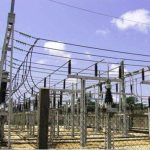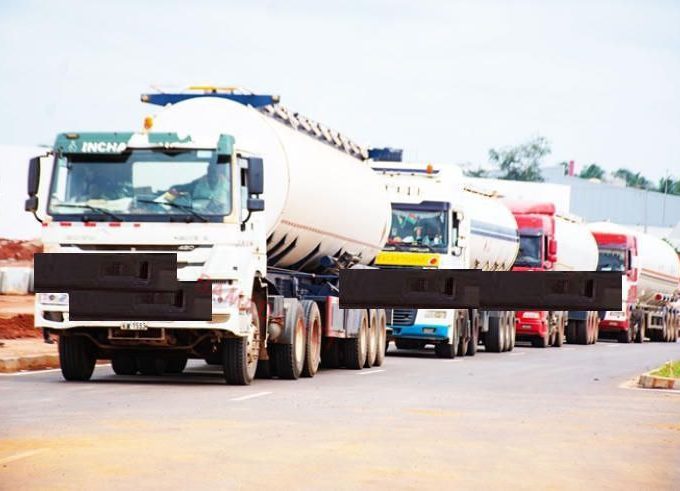
FG Spent Billions On Flood Prevention Projects, Yet Over 200 Lives Were Lost
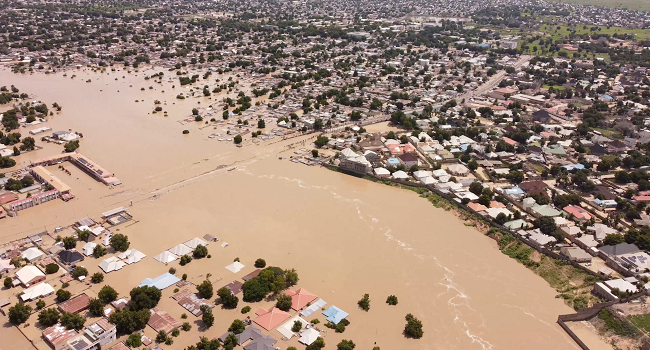
In 2024, over 1 million Nigerians have been affected by devastating floods nationwide. This is according to the National Emergency Management Agency (NEMA), which disclosed that 259 lives have been lost, and 625,239 people have been displaced across 29 states and 172 Local Government Areas (LGAs).
Meanwhile, this is a perennial crisis that claims lives and displaces Nigerians every year. At the same time, government officials pay condolences and donate relief materials to victims yearly, like in Borno, Kano, Zamfara, Bauchi, and other states that suffered a similar tragedy this year.
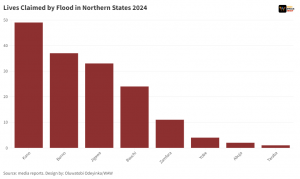
In the Northeastern Borno State, floods caused by a breach of the Alu Dam due to heavy rainfall claimed at least 37 lives while many more are still trapped in buildings submerged in water.
In Kano, at least 49 deaths were recorded, 33 in Jigawa, 11 in Zamfara, and at least 24 in Bauchi. In addition, property, houses and farmlands were destroyed. The Federal Capital Territory is not an exemption, with at least two lives lost and property worth millions of naira destroyed.
Checks by West Africa Weekly show that in the first quarter of 2024, the federal government disbursed approximately N5 billion for construction projects to prevent or control floods in selected Northern States. These states were the most impacted by floods despite the financial investment.
In Kano State, where floods reportedly claimed at least 49 lives, the Federal Ministry of Works spent N1.06 billion on the construction of roads for the prevention/control of floods. One of the roads repaired, the Tundun Wada road, was among the areas flooded after the August rainfalls.
The same ministry spent N1.03 billion in Borno on construction projects to prevent floods. But that did not prevent devastating floods that have claimed at least 37 lives and displaced about a million people.
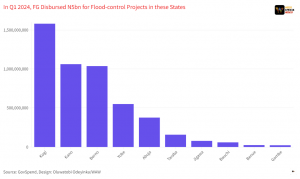
The federal government also disbursed N15.8 billion as ecological funds to all states between January and May 2024. The ecological fund aims to fund projects that can address ecology-related problems such as flooding.
Despite this annual spending, Nigerians continue to grapple with devastating floods that claim hundreds of lives each year. This raises serious concerns about the effective utilisation of public funds for flood management and mitigation efforts.
The Nigeria Hydrological Services Agency (NIHSA) has warned that there may be more floods in states close to the River Niger as a result of what the agency described as the river’s rising water level.
The Director General of the agency, Umar Ibrahim Mohammed, while quoting a report from the Niger Basin Authority (NBA), Niamey, Niger Republic, noted that the rising water level of the River Niger system was noticed in the last week of August. He warned all the states and communities along the River Niger system to be on alert.
Read: The Smart Money Woman Season 2 Set For October Release, Teases Arese Ugwu
About The Author
Related Articles
Mali’s Transition Leader Attends Swearing-In of Guinea’s President Mamadi Doumbouya
Mali’s President of the Transition, General Assimi Goïta, represented the country in...
ByWest Africa WeeklyJanuary 19, 2026Malian Army Conducts Successful Surveillance Operation in Mopti Region
The Malian Armed Forces have carried out a successful territorial surveillance operation...
ByWest Africa WeeklyJanuary 19, 2026Nigerian Security Forces Record Major Gains Against Armed Groups
Niger’s Defence and Security Forces have reported significant results following a week...
ByWest Africa WeeklyJanuary 19, 2026Fuel Supply Improves in Bamako as Hundreds of Tankers Arrive
Bamako has recorded a significant improvement in fuel supply following the arrival...
ByWest Africa WeeklyJanuary 19, 2026



